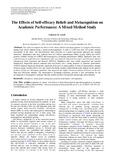Please use this identifier to cite or link to this item:
http://ir-library.mmust.ac.ke:8080/xmlui/handle/123456789/1271Full metadata record
| DC Field | Value | Language |
|---|---|---|
| dc.contributor.author | Aurah, Catherine M. | - |
| dc.date.accessioned | 2019-03-18T08:27:15Z | - |
| dc.date.available | 2019-03-18T08:27:15Z | - |
| dc.date.issued | 2013 | - |
| dc.identifier.uri | http://r-library.mmust.ac.ke/123456789/1271 | - |
| dc.description | metacognitive prompting experience | en_US |
| dc.description.abstract | This study investigated the effect of Self-efficacy Beliefs and Metacognition on Academic Performance among high school students using a mixed method approach. A total of 2,138 form four (12th grade) students participated in the study. The mixed-method study consisted of a quasi-experimental approach and in-depth interviews. Quantitative data were collected from self efficacy questionnaire (SEQ), biology ability test (BAT), genetics problem solving test (GPST) and metacognitive prompting questionnaire (MPQ). Qualitative data were collected using in-depth interviews. Quantitative data were analysed using both descriptive and inferential statistics (hierarchical linear regression and factorial ANOVA). Qualitative data were coded, categorized and reported thematically. Regression analysis indicated that self-efficacy was a strong predictor of academic performance. ANOVA analysis displayed statistically significant differences in metacognition in form of metacognitive prompts between groups. Gender effects were also noted with female students outperforming male students on the genetics problem solving test. Subsequent qualitative data suggested that highly efficacious students did better on the tests than less efficacious students. The metacognitive prompting experience provides a rich environment for the development of metacognitive strategies that can promote problem solving skills among high school students. | en_US |
| dc.description.sponsorship | © Science and Education Publishing | en_US |
| dc.language.iso | en | en_US |
| dc.publisher | MMUST | en_US |
| dc.relation.ispartofseries | 2013, Vol. 1, No. 8, 334-343; | - |
| dc.subject | self-efficacy, metacognitive prompting, academic performance, self regulation | en_US |
| dc.title | The Effects of Self-efficacy Beliefs and Metacognition on Academic Performance | en_US |
| dc.title.alternative | A Mixed Method Study | en_US |
| dc.type | Other | en_US |
| Appears in Collections: | Journal Articles | |
Files in This Item:
| File | Description | Size | Format | |
|---|---|---|---|---|
| The Effects of Self-efficacy Beliefs and Metacognition on Academic Performance A Mixed Method Study.pdf | 198.04 kB | Adobe PDF |  View/Open |
Items in DSpace are protected by copyright, with all rights reserved, unless otherwise indicated.
